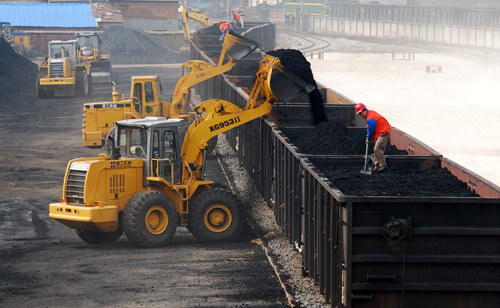
 |
| PRICING FOR COAL: Thermal coal is transported from a coal storage and transportation base in Jiujiang, Jiangxi Province (HU GUOLIN) |
With a government-imposed ceiling on thermal coal prices lifted, China must now ensure a stable output of electricity
China will no longer limit the cost of coal for power stations amid a situation of stable prices and supply, leaving some worried that the country's electricity output could come under threat if coal prices soar.
The National Development and Reform Commission (NDRC) said it would no longer coordinate contracts between coal companies and power plants as of January 1, 2013, leaving them to settle coal prices through negotiations.
With this decision, power plants will no longer enjoy preferential coal prices set by the government and will have to purchase coal at market figures. The price limit for coal supplied to power stations was set at 800 yuan ($127) per ton in 2012.
Nonetheless, should the cost of coal soar in the coming year, which some experts suspect may be the case, electricity will still be sold at a fixed rate, with the government making up for any losses. The public, therefore, won't have to worry about price hikes on their electricity bill.
After the global financial crisis, electricity consumption by Chinese companies declined, reducing the profits of power generators. In the meantime, the sales volume of coal companies dropped sharply, and the coal industry bottomed out.
Why has the government lifted the coal price cap now? According to a NDRC press release, the move was done in order to speed up transformation of the country's economic growth pattern and to enhance the role of the market in allocating resources.
According to the NDRC release, coal accounts for 70 percent of primary energy production and consumption, while consumption of coal by power plants accounts for 60 percent of the country's total. At the core of the thermal coal pricing reform is a bid to create an environment for fair competition and to realize the sustainable and sound development of the coal and power industries.
Time to reform
China's market-oriented reform of coal prices began in 1993, when the government gradually relaxed its pricing of the fossil fuel. Linked to international figures, China's coal prices soared, intensifying pressure on power companies. Since 1996 the Chinese Government began to adopt government-guided prices on coal supplies to power plants, which were much lower than market cost. Every year the NDRC coordinates the signing of a supply contract between large coalmines and power plants. This is how the price system for thermal coal was first established.
In 2002, government-guided prices of thermal coal were abolished, though the NDRC issued recommended figures and stated that it would intervene if need be. Since 2008, the cost of coal, especially thermal coal, increased sharply. Given the impact on people's livelihoods, electricity prices could not be raised frequently to cover soaring coal costs.
Therefore, the government intervened. In 2011, the NDRC stated that thermal coal prices must rise no higher than 5 percent in 2012, and that of thermal coal at 5,500 kilocalorie (kcal) per kg must not exceed 800 yuan ($127) per ton, although the market cost was 860 yuan ($137) per ton at the time.
Under certain conditions, provisional intervention on thermal power prices has played a positive role in ensuring national economic development.
As the short supply of thermal coal was alleviated in 2012, the price gap between market figures of thermal coal and government-agreed costs was narrowed. In some regions, market prices were even lower than the government-fixed figures, thereby increasing the need to abolish government-coordinated contracts and let the market determine costs.
According to the Bohai-Rim Steam Coal Price Index, in December 2012 the price of thermal coal at 5,500 kcal per kg in the Bohai-rim region dropped to 635 yuan ($101) per ton, much lower than the 800 yuan per ton set by the NDRC.
To most of the coalmines and power plants, the single-price system of thermal coal will have limited impact on their business operations and will not affect the normal production of coal and power enterprises, according to the NDRC release. Therefore the NDRC has decided to abolish provisional price intervention.
After government-coordinated contracts are abolished, the price of thermal coal will depend on market supply and demand. Given that it is now winter, the demand for coal is rising rapidly but will decline after mid-February. As for supply, China's major coal producing regions including Shanxi and Shaanxi provinces, and Inner Mongolia Autonomous Region are expanding their production capacity, while major international coal production countries will expand their exports to China because of sluggish overseas demand. Therefore in the next few months or even longer, surplus supply will not change substantially. Moreover, since the stockpiles of thermal coal in power plants are already high, prices are unlikely to rise, providing an opportune time to reform the market.

















 The strongest left-behind children: 9-year-old girl holds up a family
The strongest left-behind children: 9-year-old girl holds up a family


![]()
